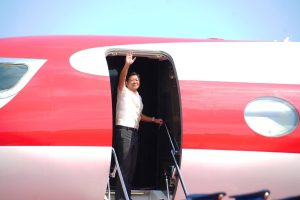Philippine President Ferdinand Marcos Jr. yesterday denied the existence of a “gentleman’s agreement” between his predecessor and the Chinese government that Manila would not make repairs to a military outpost on a contested shoal in the South China Sea.
Last week, Harry Roque, who served as Rodrigo Duterte’s presidential spokesperson, told the media that Duterte had agreed informally to observe the status quo in disputed waters and refrain from the construction of military outposts.
As part of the alleged agreement, Roque said, Duterte agreed that the Philippines would not send construction materials to repair the BRP Sierra Madre, a rusting warship grounded in the shallow waters of Second Thomas Shoal. The ship was purposefully grounded in 1999, in order to give the Philippines a foothold on the shoal, which lies within its 200-nautical-mile exclusive economic zone (EEZ).
“We don’t know if it’s a secret agreement. We don’t know anything about it. There is no documentation, there is no record,” Marcos told reporters before leaving for Washington, where he will hold a summit today with U.S. President Joe Biden and Japanese Prime Minister Kishida Fumio, Rappler reported. “We were not briefed when I came into office.”
Marcos added that his staff was talking to ex-officials from the Duterte administration, but “we still haven’t got a straight answer.”
“I am horrified by the idea that we have compromised, through a secret agreement, the territory, the sovereignty, and the sovereign rights of the Filipinos,” he added.
Other prominent members of the Duterte administration, including former chief presidential legal counsel Salvador Panelo, Defense Secretary Delfin Lorenzano, and Interior Secretary Eduardo Año, have denied that Duterte brokered a special agreement with China’s government.
Allegations about the agreement have surfaced as a result of a string of intensifying confrontations between Chinese and Philippines vessels close to Second Thomas Shoal. These have resulted from the China Coast Guard (CCG)’s attempt to block routine resupply of the small detachment of marines stationed aboard the Sierra Madre. This has resulted in several incidents in which Philippine supply boats have been rammed and shot with high-pressure water cannons, in some cases injuring crewmembers.
In justifying its aggressive actions, China has accused supply ships of bringing construction materials to reinforce the vessel, violating an apparent earlier agreement that only basic supplies would be delivered to the Philippine marines stationed at the vessel. Chinese officials have also made reference to a promise that the Philippines made to remove the ship from the shoal, though it has not made clear whether this was made by Duterte or one of his predecessors.
Last week, Chinese Foreign Ministry Spokesperson Wang Wenbin said that Manila “has been going back on its words and provoking China” over Second Thomas Shoal, without explicitly mentioning any agreement. The Philippine Department of Foreign Affairs has denied the existence of any agreement to remove the Sierra Madre from Second Thomas Shoal, insisting that Manila has the sovereign right to do whatever it wishes within its EEZ.
While Roque’s claim of a “gentleman’s agreement” has not yet been confirmed – in his comments to reporters yesterday, Marcos said he would meet with Chinese Ambassador Huang Xilian upon his return from the U.S. in order to “clear up” the issue – it would be very much in character for Duterte. Upon coming to office in 2016, Duterte steered his country into a closer alignment with China, downplaying the disputes in the South China Sea in the hope of gaining Chinese financing for large-scale infrastructure projects. Given Duterte’s erratic leadership approach, it is entirely possible that he made a rambling, off-hand promise to Chinese leader Xi Jinping – one that Beijing chose to interpret as a binding commitment.
Since taking office in 2022, Marcos has clarified and drastically reoriented Philippine foreign policy, strengthening maritime security cooperation with Washington and expanding the U.S. Army’s access to Philippine military facilities under the 2014 Enhanced Defense Cooperation Agreement. This has been both a response to and a cause of the growing tensions in the South China Sea, particularly around Second Thomas Shoal.
During the upcoming U.S.-Philippines-Japan summit in Washington, Biden is expected to warn China about its increasing assertiveness in contested parts of the South China Sea, and affirm that the Sierra Madre is covered by the 1951 U.S.-Philippines Mutual Defense Treaty.

































